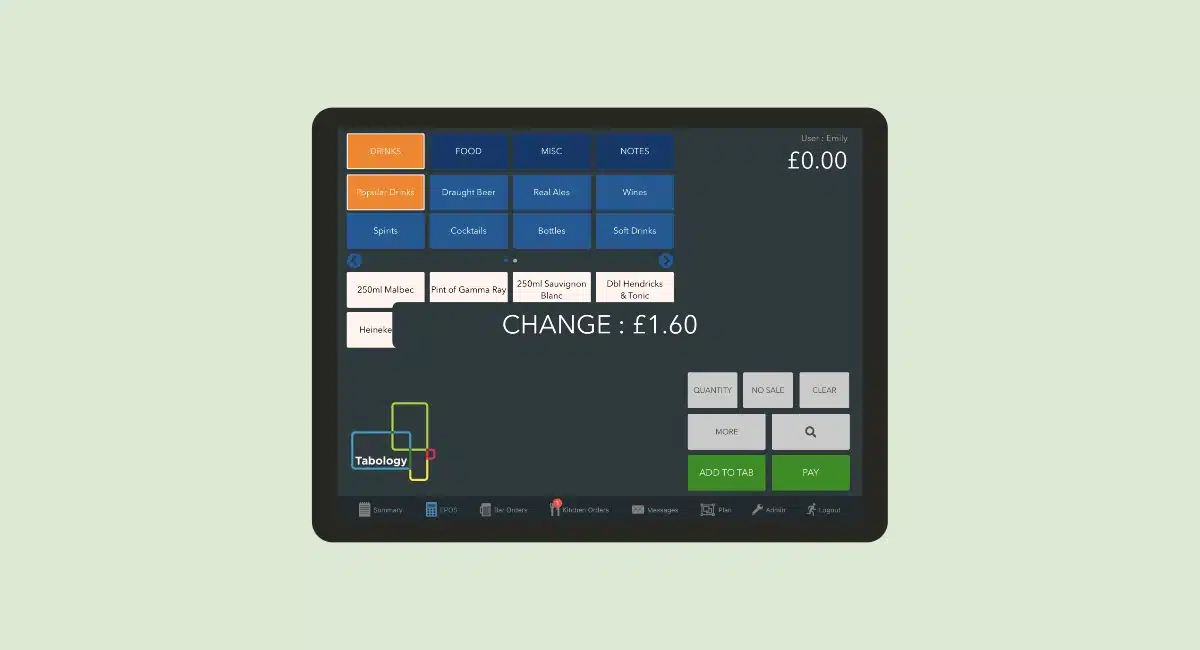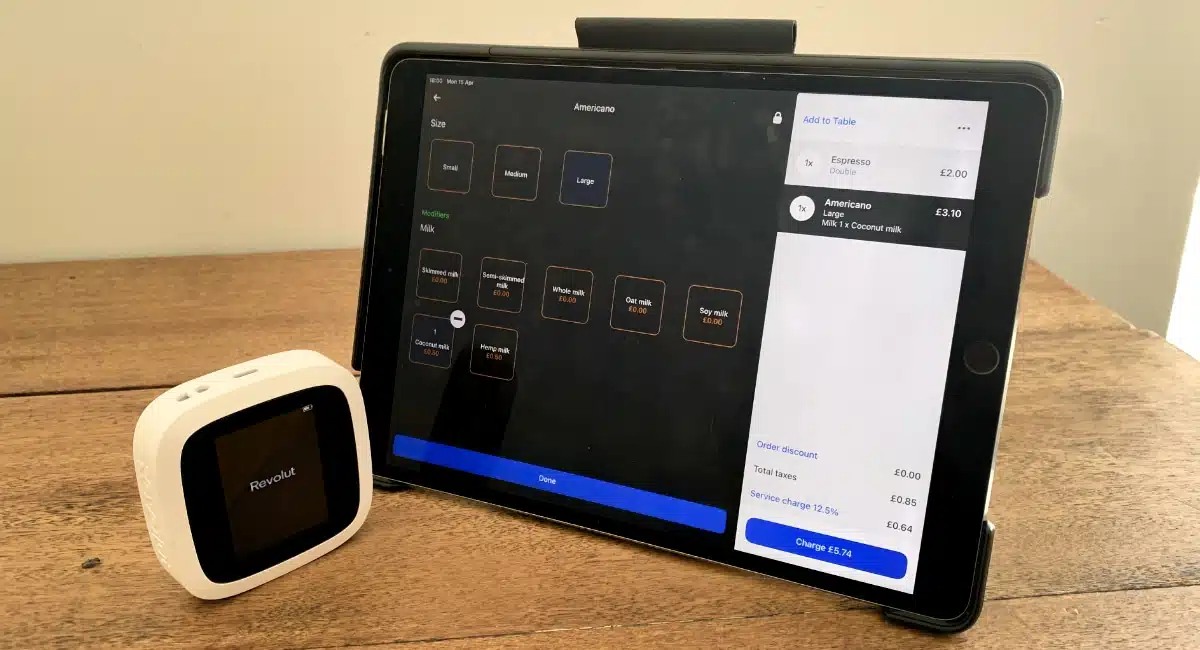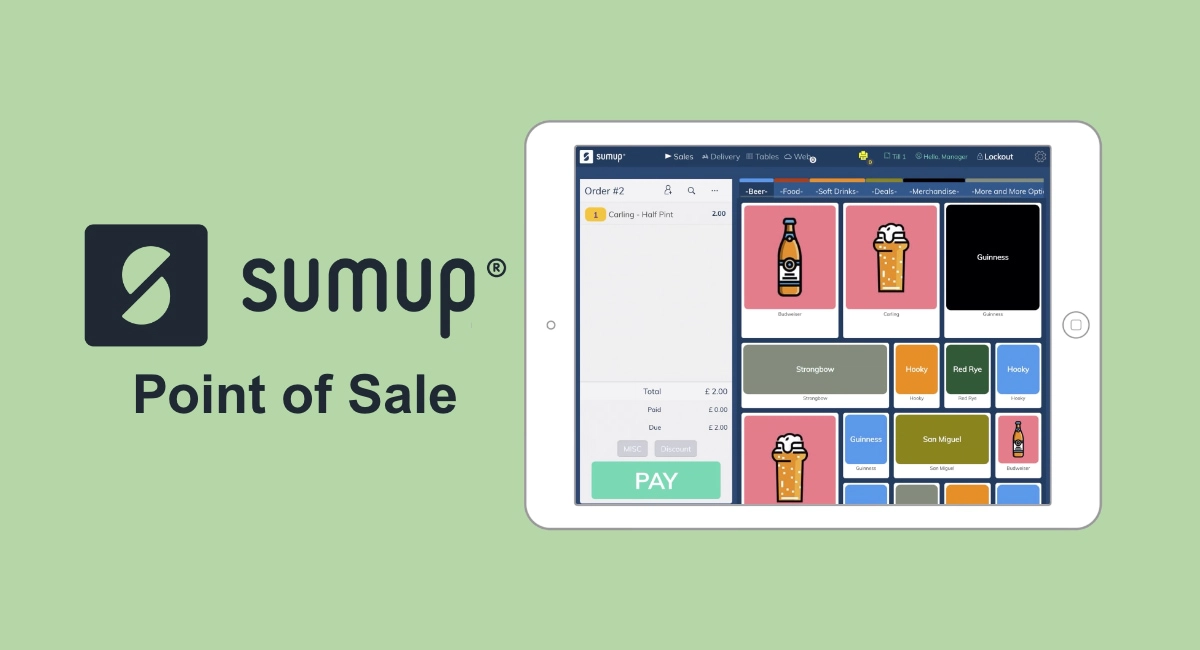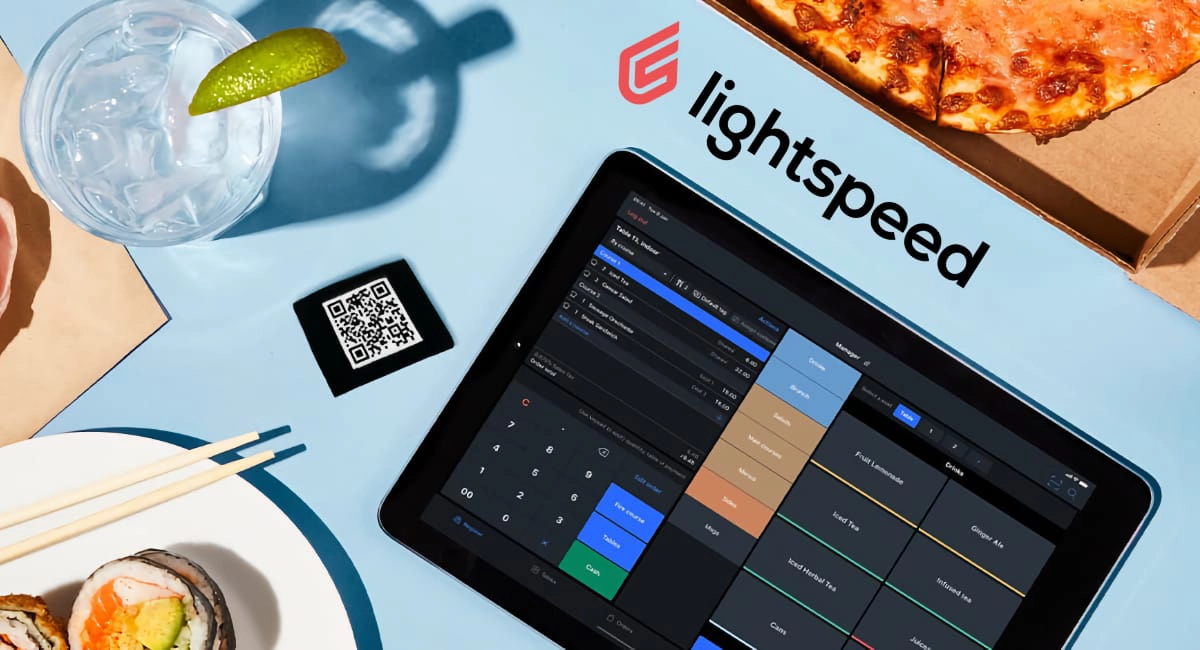What is Tabology?
Tabology is a British, hospitality-focused electronic point of sale (EPOS) system. It was originally created for the bar and pub industry, but the platform has developed its features to encompass other food and drink businesses, such as restaurants, food trucks and cafés.
The till interface is compatible with iPad, not Android tablets or computers. There is also a Back Office account accessed in a computer browser, where business owners can manage settings, reports, administrative tasks, stock and much more.
Pricing
Tabology offers three monthly subscription plans with varying levels of features.
Tabology plans:
- EPOS Essentials: Core electronic point of sale (POS) system with comprehensive stock management and mobile ordering
- EPOS Pro: Above features plus loyalty, campaigns, bookings, staff scheduling, digital menu and multi-location management
- EPOS Partner: Above features plus custom branding, personalised service and API access
The plans include one iPad till licence. Software for additional tills costs £39 + VAT monthly each. None of these prices include hardware, just the software.
| Tabology fees | |
|---|---|
| Subscription (incl. 1 till licence) | EPOS Essentials: £39 + VAT/mo EPOS Pro: £59 + VAT/mo EPOS Partner: £99 + VAT/mo No contract lock-in, cancellable any time |
| Additional POS licences | £39 + VAT/mo for each extra licence |
| Kitchen display screens | £11 + VAT/mo each |
| iPad menus | £10-£14 + VAT/mo per menu |
| Mobile ordering transaction fees | 1.5%-2.5% + 20p |
| Tabology fees |
|
|---|---|
| Subscription (incl. 1 till licence) | EPOS Essentials: £39 + VAT/mo EPOS Pro: £59 + VAT/mo EPOS Partner: £99 + VAT/mo No contract lock-in, cancellable any time |
| Additional POS licences | £39 + VAT/mo for each extra licence |
| Kitchen display screens | £11 + VAT/mo each |
| iPad menus | £10-£14 + VAT/mo per menu |
| Mobile ordering transaction fees | 1.5%-2.5% + 20p |
You also have the option to add kitchen display screens for £11 + VAT per screen monthly. A digital menu can be added for £10-£14 + VAT per iPad. These prices exclude the cost of iPads, which you have to purchase yourself.
If you opt for mobile ordering, where customers pay for orders on their phones, the cost is 1.5%-2.5% + 20p per transaction. We’re told these fees are going to be reduced in the near-future. Fees for card machine transactions are charged by your chosen payment provider, e.g. SumUp or Dojo.
See also: Comparison of leading hospitality EPOS
Ease of use and accessibility
We generally had a positive impression of the Tabology point of sale (POS) interface on iPad. The app is actually called BarTab EPOS, not Tabology, and is available in the App Store on iPad.
The interface is clearly designed for intuitiveness. There’s a standard menu layout where you easily find menu items for orders, and a bottom menu leading to order sections, table plans, messages and administrative functions.
We liked the big buttons, distinguished by different colours for quick identification of important functions. The choice of colours is pleasant and will aid those with visual impairment, but we noticed a tendency for some text to be either too small, squeezed, thin or low-contrast to read. The app is therefore not completely accessible for everyone, only for those with good vision.
Image: Mobile Transaction
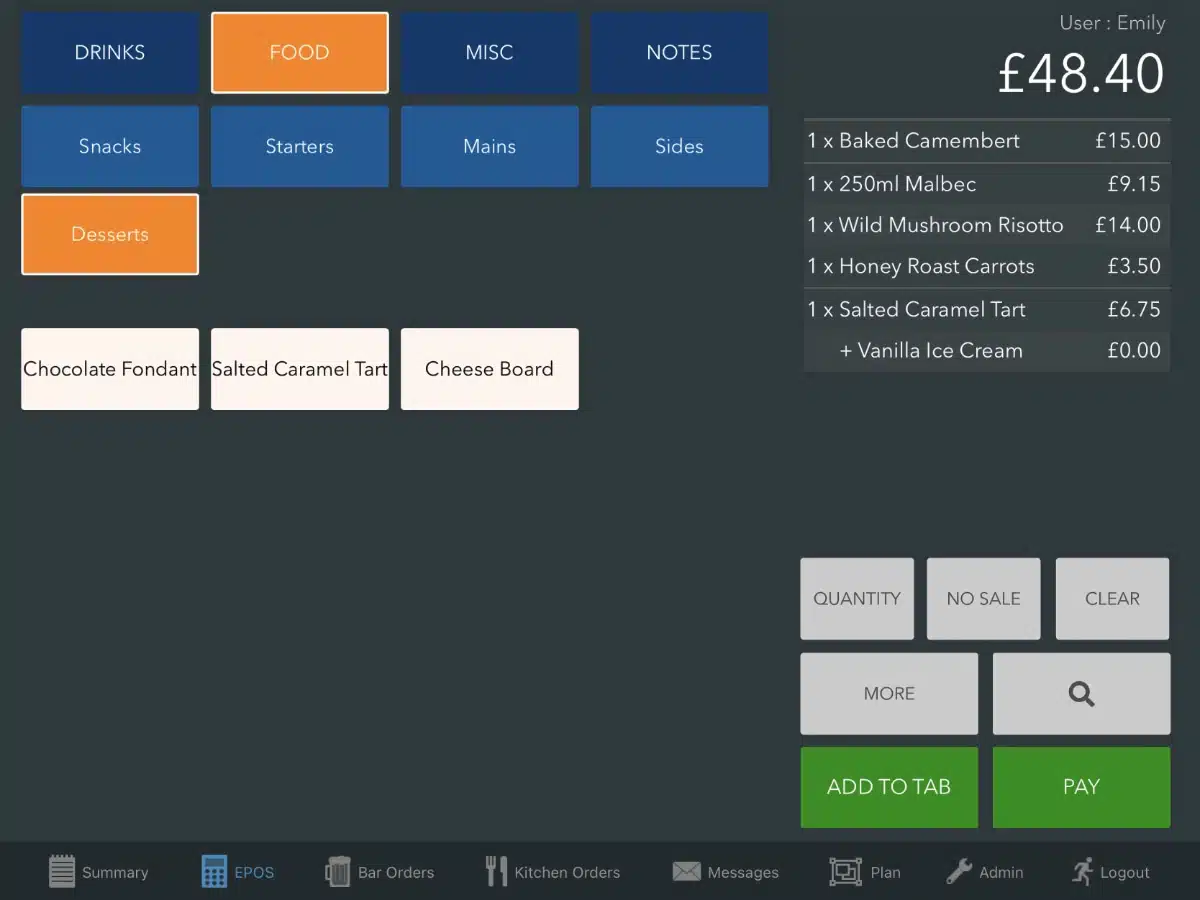
The main till interface on iPad is easy to get your head around.
What about glitches? During our testing at different times, we were interrupted by the app updating data when closing and opening the app. This is apparently to check for product updates and wouldn’t happen if you keep the app open during a work day.
There were also some instances of the software freezing when trying to access the support section and Back Office via the app, despite having a good WiFi connection. The Back Office on a desktop also had some glitches, like not being able to click on question marks that are supposed to provide explanatory information.
The software is continuously improved and new features added, as can be seen every time you log into Back Office with a pop-up summary of the latest changes. We struggled a bit finding certain functions through the Back Office menu, though, since buttons had tiny text and could be structured in a clearer way.
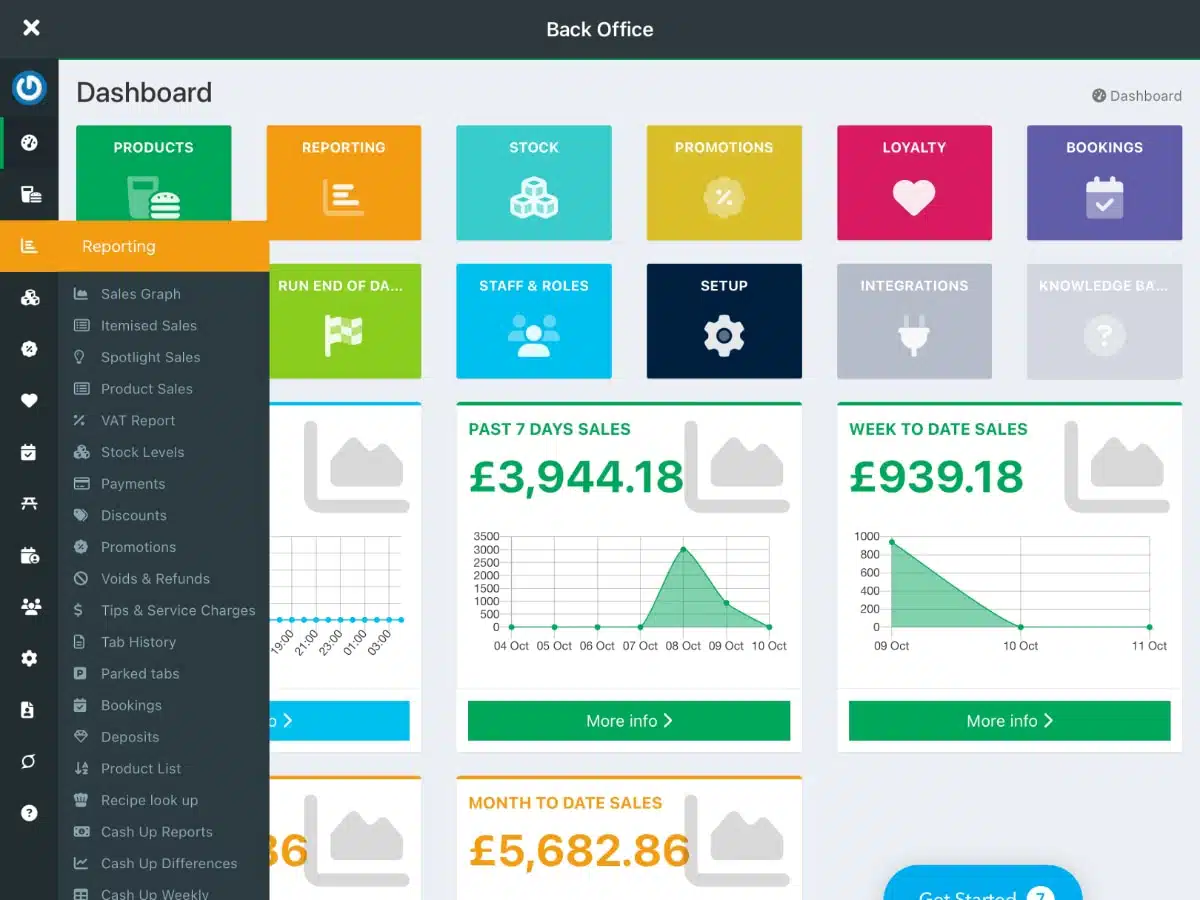
Back Office dashboard and side menu example, as viewed on iPad.
But you get the sense that the developer team behind Tabology is actively taking in feedback from users and open to any improvement suggestions – which is a rare advantage in POS software.
POS features
Tabology has more point of sale (POS) features than most similarly priced competitors. Among essentials for bars and restaurants, you get a detailed drinks-and-food menu, extensive stock management, table plans and much more.
Apart from core EPOS features, Tabology has made a real effort to add business functions normally requiring external software. This includes customer loyalty, staff scheduling, bookings, comprehensive reports and online ordering.
Let’s have a look at some of the core features:
Till features: Apart from food and drink categories with variants and options per menu item, the checkout interface contains handy functions like ‘no sale’, item quantity, discounting, tipping, customer notes and editing open tabs. Opening and closing cash floats can be recorded, and Z and X reports generated, as with most EPOS systems.
Service charge settings are set in the Back Office and will apply where applicable. And usefully when serving alcohol, you can record whether the customer’s proof of age is okay or not, or if a drink is refused.
Image: Mobile Transaction
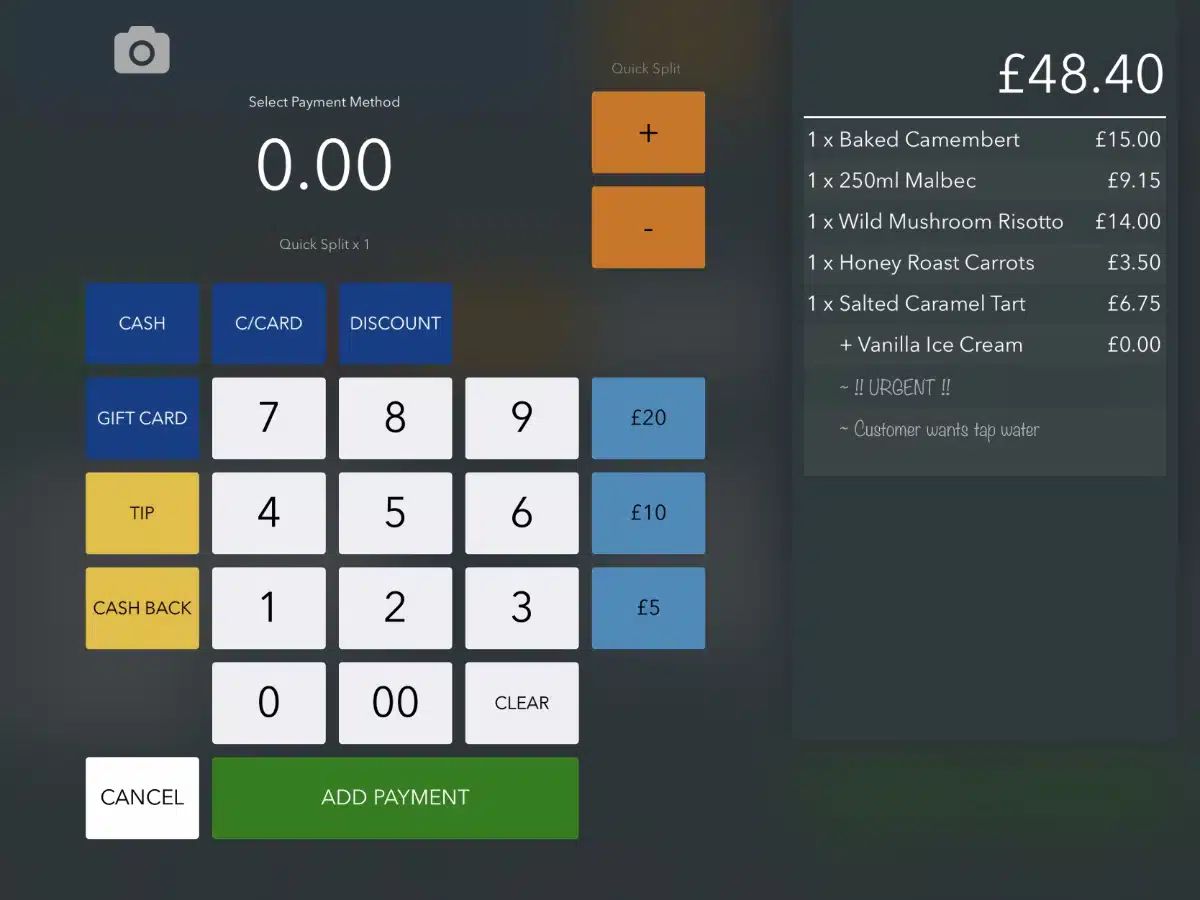
The checkout screen showing payment methods and the order summary.
Inventory: One of the clear strengths of Tabology is the stock management system. When you’re just setting up, there are lots of details to add so you can track ingredients, sales, kegs, wastage, costs etc. automatically. With the help of so-called product templates, certain stock settings automatically apply to other relevant products, so it’s faster to set up the system.
The customer support team is there to guide you through the setup and can upload any details you already have in a spreadsheet. Products can also link to suppliers, enabling the system to submit supplier orders in advance of running out.
Is someone allergic to an ingredient? Or need a reminder of how to mix that drink? If so, staff can look up recipes and nutritional information for food and drink items.
Image: Mobile Transaction
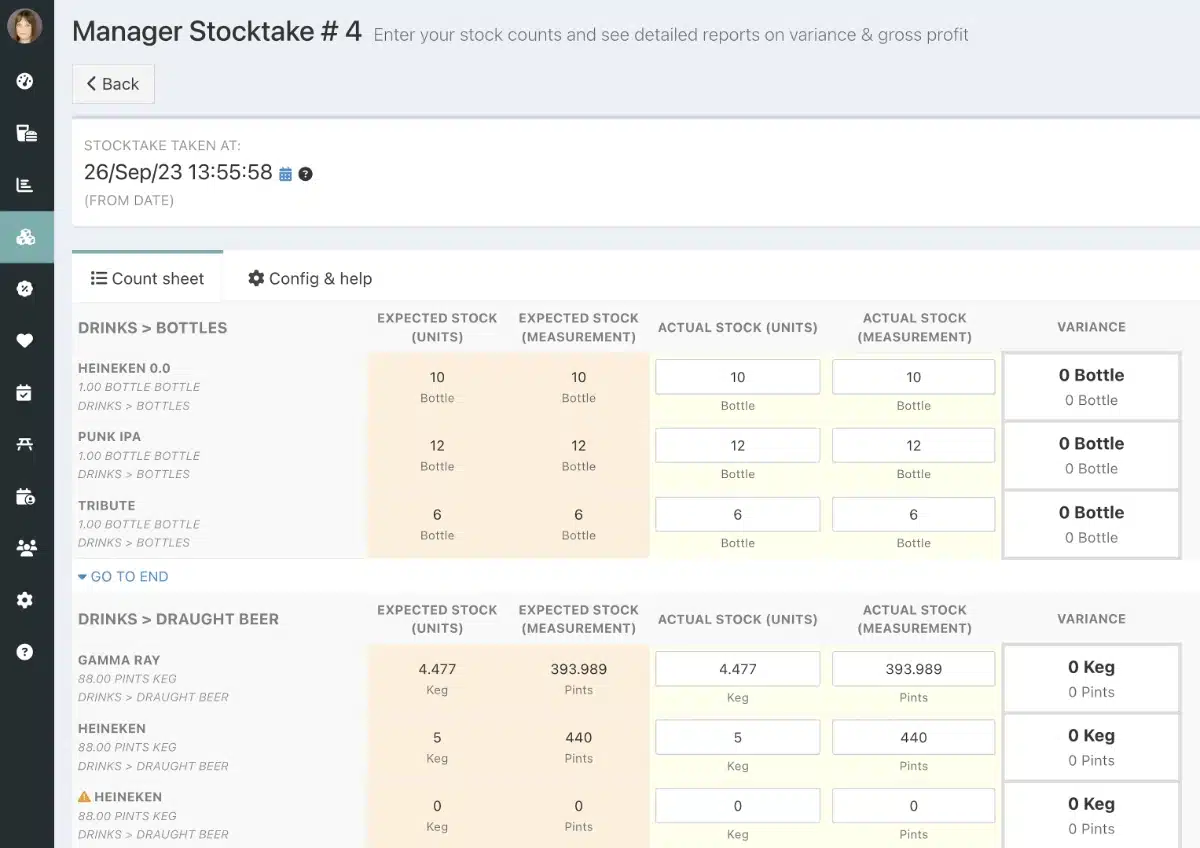
Example of a stocktake page, as viewed in Back Office on a computer.
Reports and analytics: Tabology’s Back Office contains an impressive range of reporting options. Things like sales trends, staff performance, stock, VAT, promotions and voided sales can be analysed in much detail. Often in POS systems, custom reports are only available on premium plans, but Tabology includes all the reporting on even the cheapest plan.
Employee management: You can add different team members for till logins, rotas, hourly pay and permissions. This allows you to create detailed staff schedules that can be monitored in real time from Back Office and link to payroll.
Image: Mobile Transaction
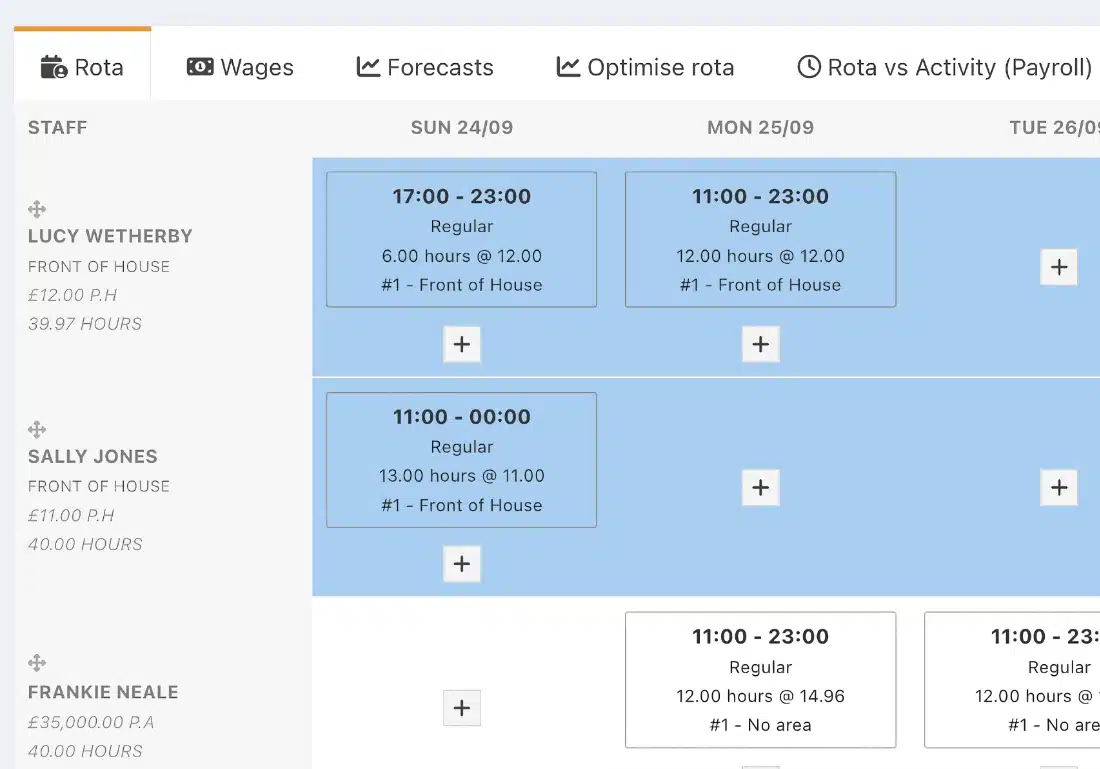
Part of a staff rota with detailed hours, as viewed in Back Office.
Logging in with a staff PIN is quick and easy. Usefully, the till screen can flash red rather visibly if logged out and there’s a new food or drink order that hasn’t been acknowledged. This will prompt the person on the till to log in and deal with it, instead of neglecting the customer who ordered.
Customer loyalty: All plans allow you to set up many different types of promotions, for example Happy Hour deals and points-based offers.
Customers can accumulate points if you sign them up on the EPOS, after which they are emailed a QR code (no loyalty app is required) to scan like a loyalty card. In a similar vein, gift cards are created in the form of a QR code that gets added to the customer’s Apple Wallet or Google Wallet.
Customer loyalty profiles allow food-and-drink venues to analyse the type of products purchased. If customers opt into getting emails, you can also create targeted email campaigns via Mailchimp.
Image: Mobile Transaction
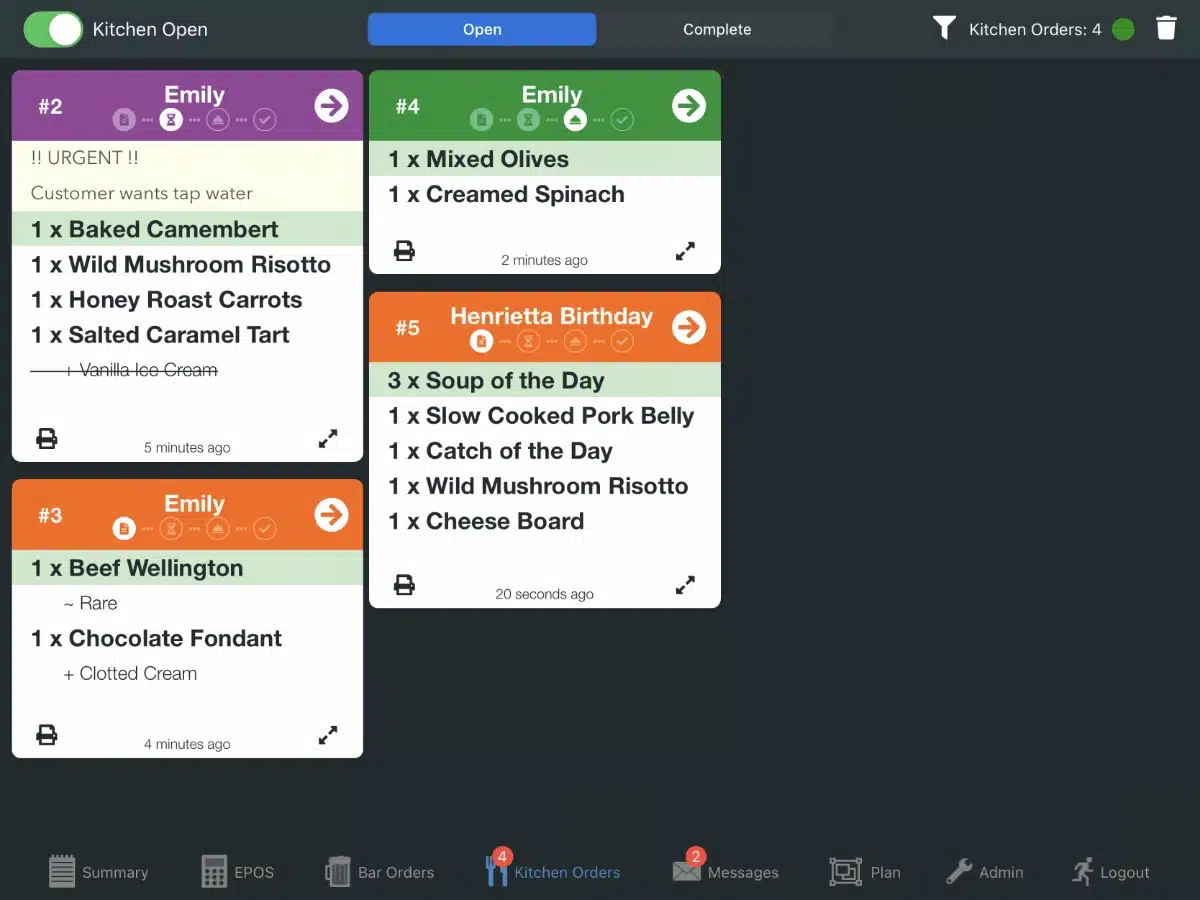
The kitchen display system is easy to skim and understand.
Kitchen management: Restaurants can link their EPOS with a kitchen display system (KDS) for iPad. This gives real-time order updates in a digital format, as opposed to using a kitchen printer (though that is an option to add). Note that each KDS display costs a monthly fee, plus the cost of an iPad.
Booking system: On the Pro and Partner plans, Tabology provides an online booking system that your customers can use. Upon reserving a table, you can require a deposit payment from the customer to prevent losing money from no-shows. Bookings are sent directly to the EPOS app for your confirmation.
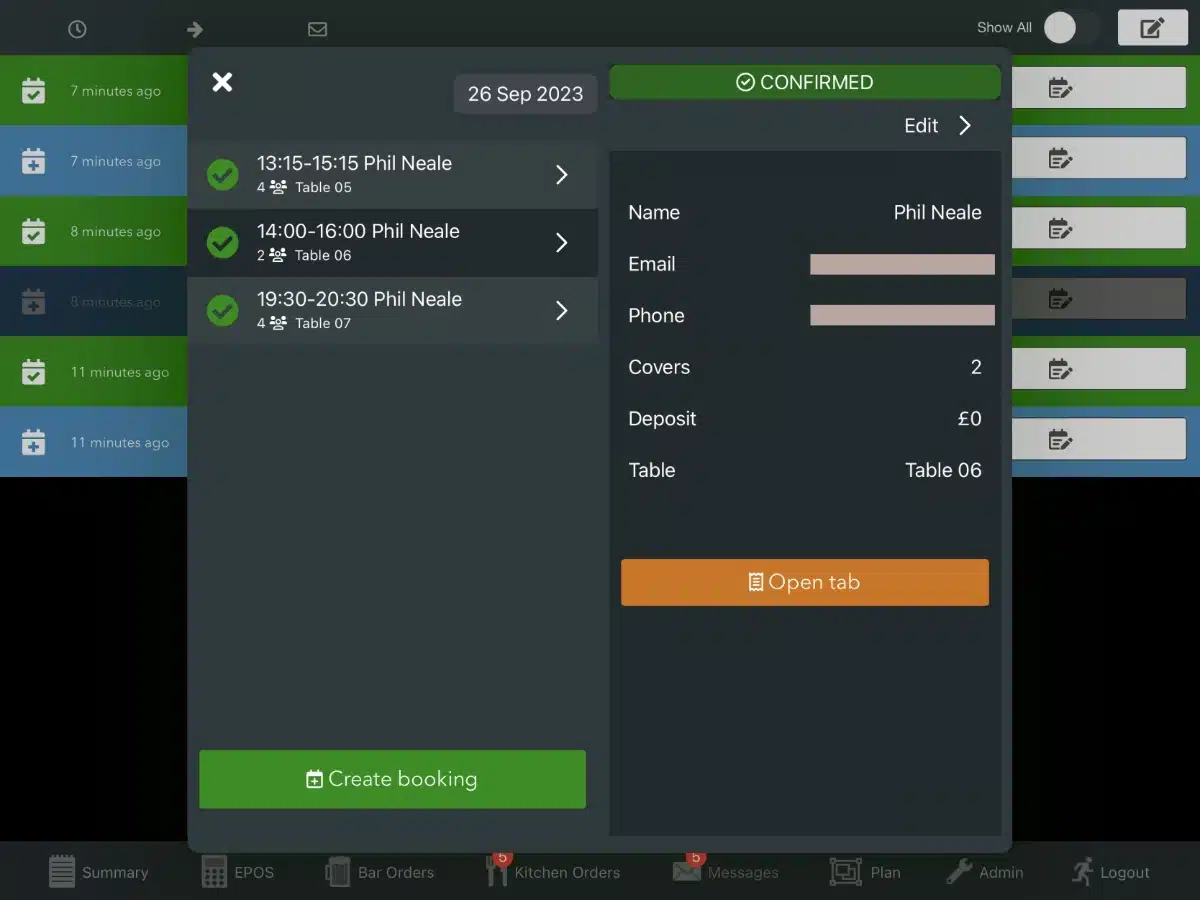
Online bookings appear in the BarTab EPOS app.
Multiple location management: The Pro and Partner plans let you add different locations to distinguish stock, sales and processes between multiple venues.
Mobile and online ordering
It’s really worth noting that all subscriptions include an online page you can set up for remote orders. This can be used for QR code ordering on your premises, your website or Google My Business (search engine listing).
The page takes the customer through the entire ordering process, from selecting menu items to completing the payment online. Orders are sent in real time to your kitchen (if you have a kitchen display system or kitchen printer) and EPOS app.
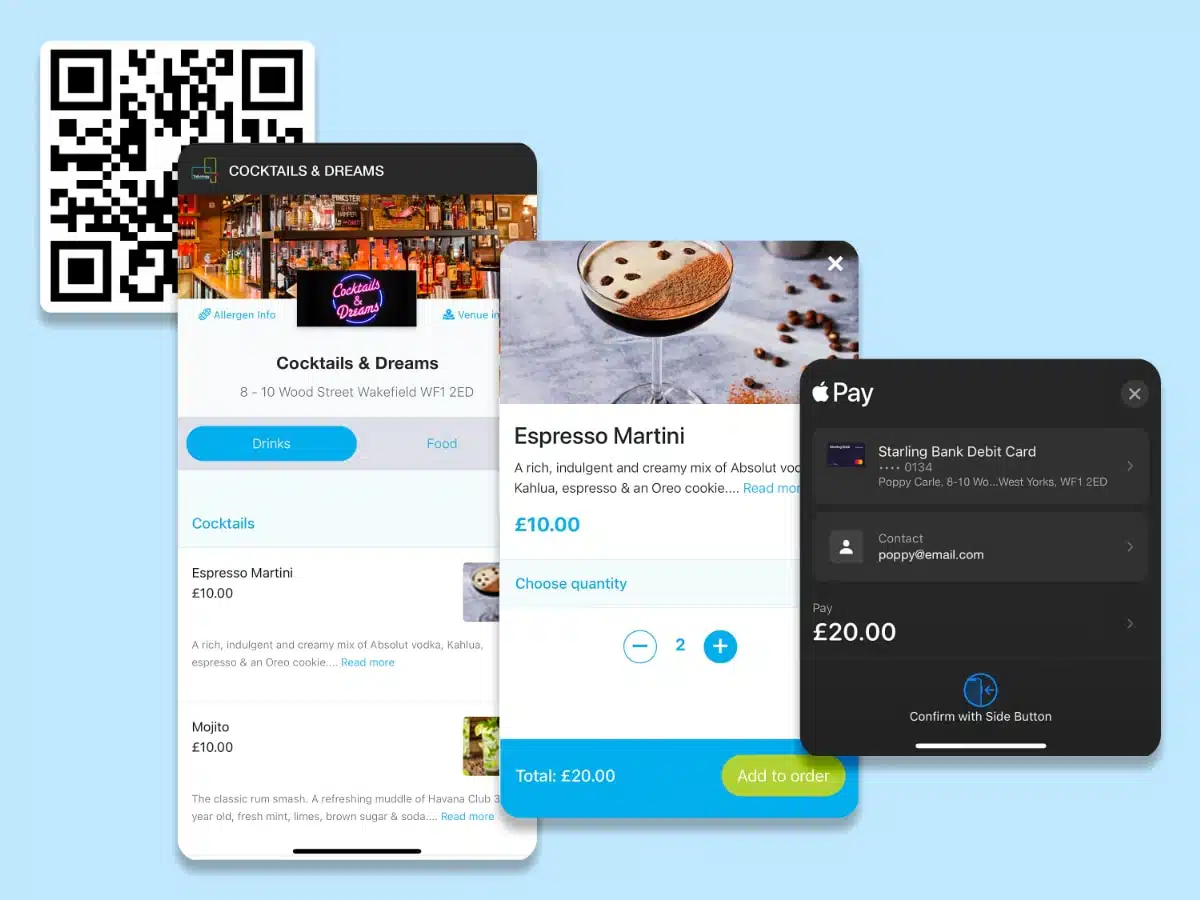
All Tabology plans include Mobile Ordering, where customers can order via a QR code or link.
The payment system is already built into the mobile ordering product, but it’s possible to link it with your own Stripe account if preferred.
Hardware and card machine payments
The till app only works on iPad, so any checkout equipment has to be compatible with that. Its quite common for affordable POS systems to only work on iPad, given its high security standards and quality of hardware. But it does mean that you can’t get a custom register touchscreen built for hot and greasy environments.
With a protective screen cover and iPad stand, though, you can keep the tablet safe. The software is also compatible with till drawers, receipt printers and even a portable barcode scanner. Select models of these are available to purchases individually or in a bundle from Tabology’s online store.
What about card machines? Currently, Tabology can integrate with card terminals from Dojo, Paymentsense, Zettle by PayPal and SumUp. The card machine models differ between these providers, as do the costs of accepting card payments.
To summarise the options, SumUp and Zettle have simple fees without any long-term contract. Paymentsense and Dojo (essentially the same company) have contract lock-ins and offer tailored fees. Dojo’s 6-month term is the most popular for small businesses with its straightforward costs and service.
Integrations
Although most business functions are built into the Tabology platform, many businesses integrate with some external software.
A good example is the Xero integration, which enables you to link all your sales automatically with your accounting system.
Possible integrations currently include:
- Accounting: QuickBooks, Xero
- Bookings: DesignMyNight, ToGo
- Delivery and takeaway: Deliveroo, LineTen
- Hotel management: Cloudbeds
- Loyalty and marketing: Airship, GiftUp!, Mailchimp
- Products: Untappd
- Reporting and data: Microsoft Power BI
- Self-service: Enomatic
- Staff scheduling: Deputy, Workforce.com
This list is not exhaustive, as Tabology likes to add and improve its offering according to user requests.
Customer service and support
One of the standout advantages of Tabology is its extensive, friendly support on hand between 8am and midnight, 7 days a week.
Not only can you call the team for urgent help, you can also be added to a Telegram chat where your staff can message questions for a fast response by a real person. This enables you to go on serving customers (as opposed to waiting on the phone) and send photos of any potential errors on your till screen, so you don’t have to describe a problem that could just be explained with an image.
Prospective users can email, phone or submit a contact form to Tabology to enquire about the packages. Although you can’t sign up directly on the website without this first point of contact, a free trial is available for those who need it, as well as a demo call personally introducing you to the service and software. During this call, you get the chance to ask any specific questions.
In terms of contract, it’s easy to cancel any time by contacting support, after which the subscription ends without further payments.
Alternatives: Compare other pub and bar POS systems in the UK
Our verdict
For a relatively small technology company, Tabology has created a comprehensive, highly professional POS system with complex business tools to supplement. The price point is in the affordable range, with no commitment apart from a monthly rolling subscription.
The EPOS and backend business functions are especially ideal for bars and pubs, but certainly also enough for full-service restaurants and smaller eateries. From our tests and demo, it feels like you can manage most aspects of your business within the system, but different integrations are available to fill the gaps.
| Tabology criteria | Rating | Conclusion |
|---|---|---|
| Product | 4.2 | Good |
| Costs and fees | 4.2 | Good |
| Transparency and sign-up | 3.9 | Good |
| Value-added services | 4.3 | Good/Excellent |
| Service and reviews | 4.5 | Good/Excellent |
| Contract | 4.8 | Excellent |
| OVERALL SCORE | 4.3 | Good/Excellent |
| Tabology criteria |
Rating | Conclusion |
|---|---|---|
| Product | 4.2 | Good |
| Costs and fees | 4.2 | Good |
| Transparency and sign-up | 3.9 | Good |
| Value-added services | 4.3 | Good/Excellent |
| Service and reviews | 4.5 | Good/Excellent |
| Contract | 4.8 | Excellent |
| OVERALL SCORE | 4.3 | Good/Excellent |
Tabology’s customer support has been extremely responsive to our questions, and we recommend opting for a demo call for a full introduction to the software. It would have been good if people could sign up for a free trial without a personal correspondence first, though. The opening hours for support correspond with hospitality hours, and the Telegram channel for impromptu help is a nice touch you don’t often see.
The software is generally easy to work out and quick to navigate, but we noticed several visual shortcomings that could make it inaccessible for people with visual impairments. If anything like that becomes an issue for you, Tabology would most likely address them since they listen a lot to user feedback.
All in all, this is a very good EPOS system with a team behind that appears honest and eager to improve the product. If you can afford the upfront cost of iPads and are able to set up a strong, local WiFi network (since it is cloud-based), this is worth considering above competitors like Lightspeed and Epos Now.

